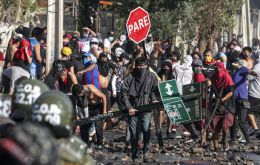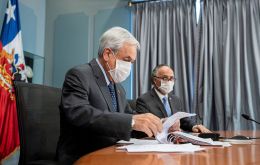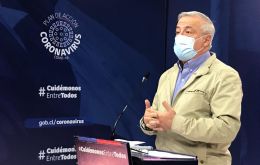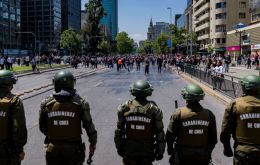MercoPress. South Atlantic News Agency
Tag: Santiago de Chile
-
Wednesday, May 20th 2020 - 08:54 UTC
Chilean army sent to contain hungry mobs in poor neighborhoods of Santiago

Coronavirus cases soared in Chile on Tuesday as soldiers were deployed to back up riot police in Santiago following clashes with demonstrators angry about food shortages and job losses.
-
Tuesday, May 19th 2020 - 08:40 UTC
Clashes with police in Santiago de Chile because of food shortages in the poorest neighborhoods

Police and protesters clashed in Santiago on Monday amid a city-wide lockdown meant to stem the spread of the coronavirus as local officials warned that food shortages had hit one of the Chilean capital's poorest neighborhoods.
-
Friday, May 15th 2020 - 08:55 UTC
Chile digging thousands of fresh graves amid a spike in Covid-19 cases

Thousands of fresh graves are being dug in Santiago's main cemetery amid a spike in Chile's COVID-19 cases, authorities said on Thursday. Chile's infection rate soared this week, prompting the government to declare a mandatory lockdown of Santiago's seven million people from Friday.
-
Wednesday, May 13th 2020 - 07:59 UTC
Chile yet to face the worst of the coronavirus outbreak, Piñera warns; Santiago health facilities on the verge of collapse

Chile is set to face the worst of the novel coronavirus outbreak in the coming weeks, President Sebastian Piñera said on Tuesday, as a sharp spike in cases and the southern hemisphere winter push its healthcare system to the limit.
-
Tuesday, May 5th 2020 - 06:37 UTC
Chile ordered new quarantine measures for three districts of Santiago

Chile ordered strict new quarantine measures on three districts in the capital Santiago after a sudden spike in coronavirus cases on Sunday. The health ministry reported a surge of 1,228 new infections, bringing the total to nearly 20,000 nationwide and dealing a blow to hopes it was over the worst of the crisis.
-
Tuesday, April 7th 2020 - 07:48 UTC
Central Chile drought has residents and mining companies clash over water rights

With historically low river flows and reservoirs running dry due to drought, people in central Chile have found themselves particularly vulnerable to the coronavirus pandemic. Years of resource exploitation and lax legislation have allowed most reservoirs in that part of the country to run dry.
-
Thursday, November 28th 2019 - 09:49 UTC
Santiago graffiti underline protests' spirit “Never again will they have the comfort of our silence”

A month of intense protests against inequality and police repression in Santiago have transformed the Chilean capital’s streetscape into a caterwaul of graffiti whose messages reflect the deep discontent in this once genteel Latin American city.
-
Wednesday, November 13th 2019 - 09:49 UTC
Protests continue in Chile as economy faces “grave consequences” and Peso plunges to a historic low

Chile’s finance minister warned on Tuesday of the “grave consequences” for the nation’s economy of three weeks of often violent unrest after the peso slid 4% to hit a historic low against the dollar. Ignacio Briones said the weakening of the peso was a “sign of worry” that he and his colleagues were watching very carefully.
-
Saturday, November 9th 2019 - 10:50 UTC
Huge peaceful demonstration in Santiago, but radicals loot a church and university

Around 75,000 people took to the streets in Santiago on Friday as part of ongoing anti-government protests in Chile. Local press reported the mostly peaceful demonstration as the second-largest since the protests broke out three weeks ago.
-
Friday, November 8th 2019 - 09:54 UTC
Chile tightens public order in the wake of three weeks of anti government protests and looting

Chile's President Sebastian Piñera on Thursday announced a series of measures to tighten public order in the wake of three weeks of anti-government protests that have left at least 20 people dead.
